2021年中考英语语法专项复习讲练---动词时态&语态课件(66张PPT)
文档属性
| 名称 | 2021年中考英语语法专项复习讲练---动词时态&语态课件(66张PPT) |  | |
| 格式 | pptx | ||
| 文件大小 | 713.7KB | ||
| 资源类型 | 教案 | ||
| 版本资源 | 人教新目标(Go for it)版 | ||
| 科目 | 英语 | ||
| 更新时间 | 2021-03-12 15:01:46 | ||
图片预览

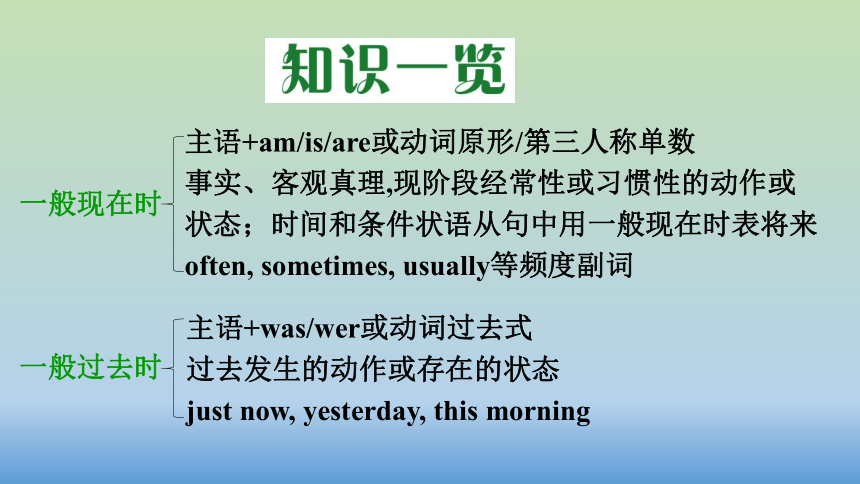
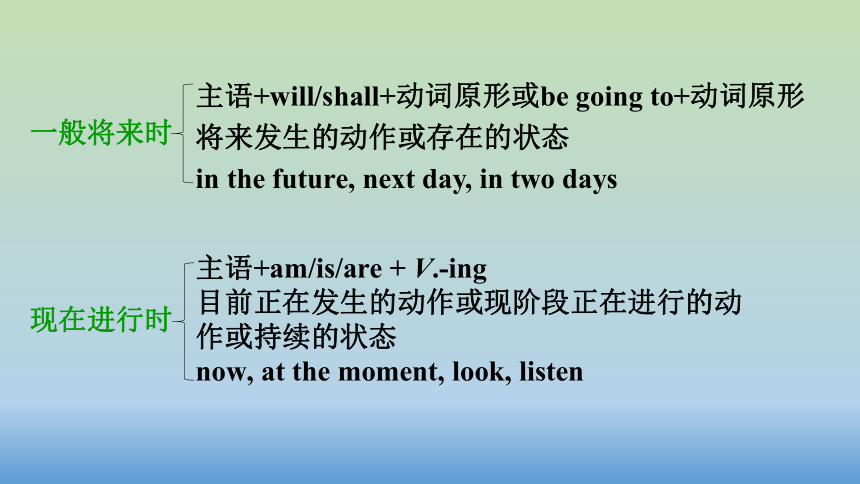
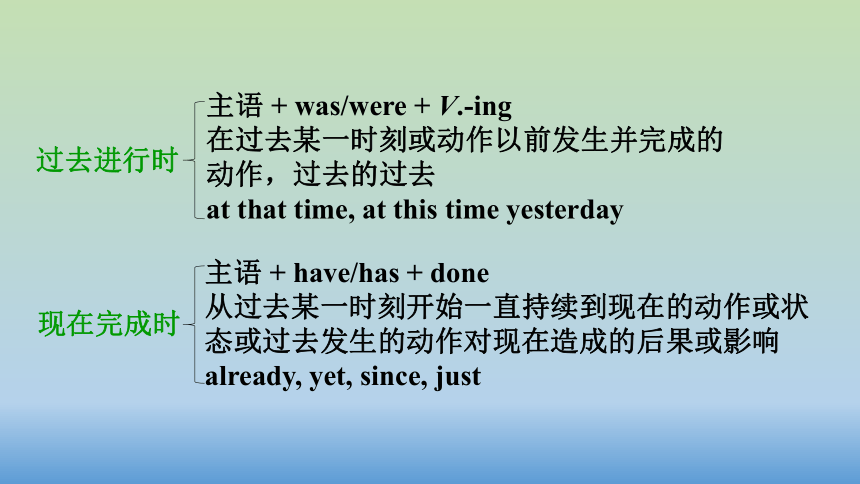
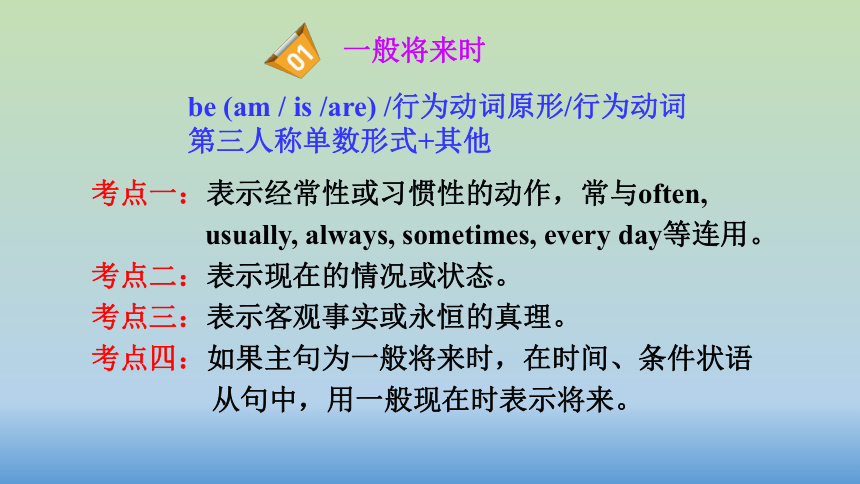
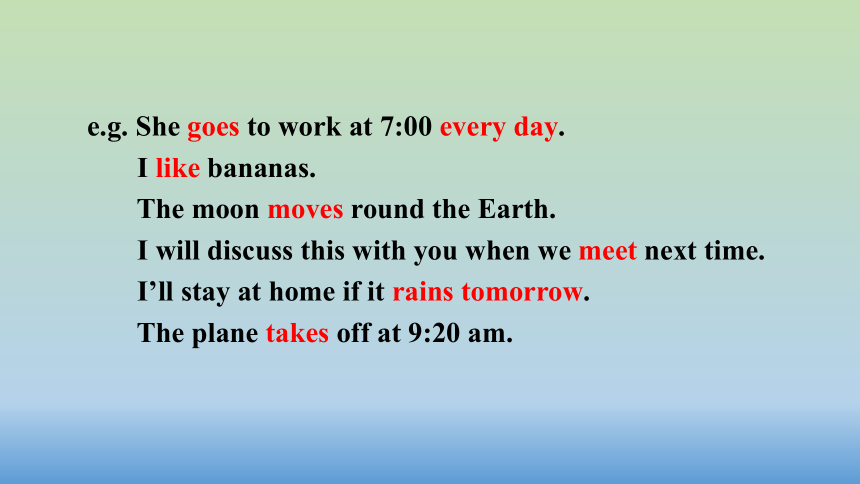
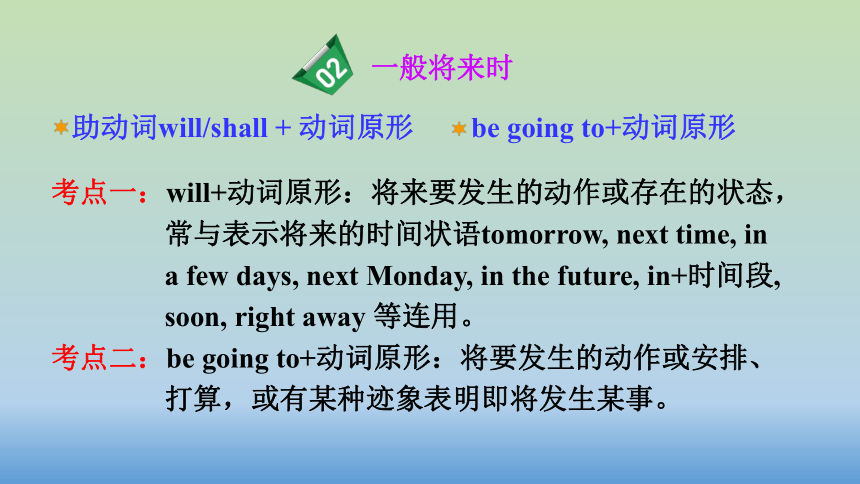
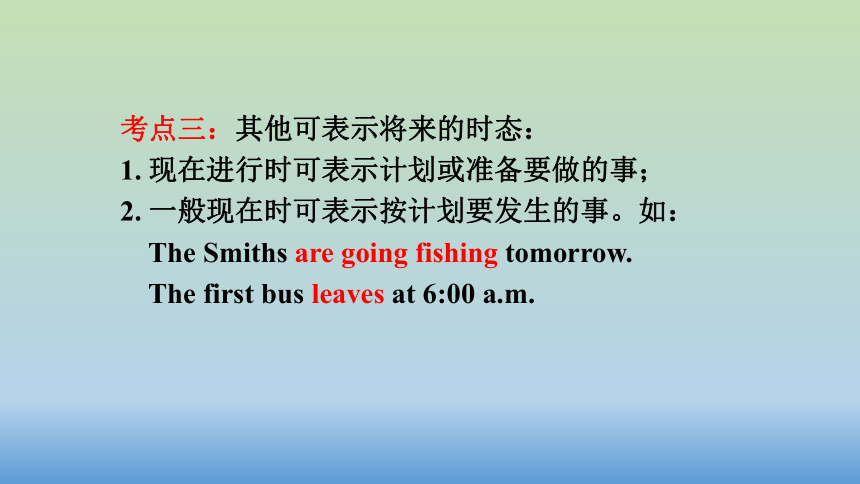
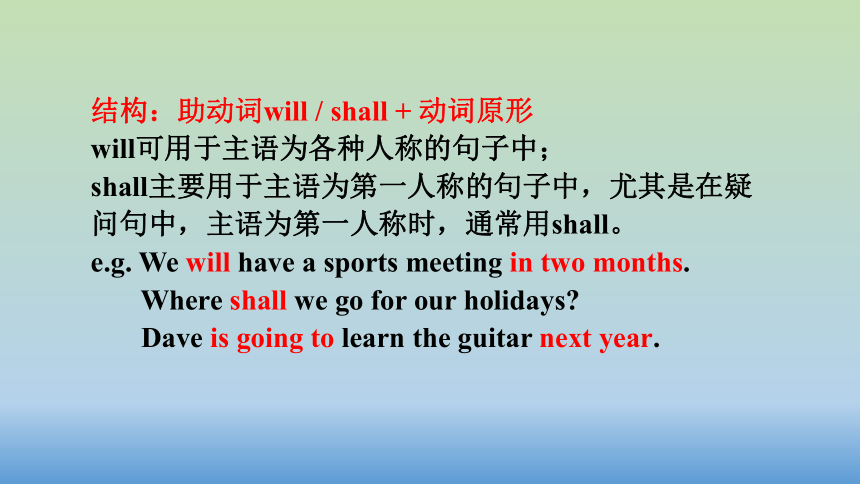
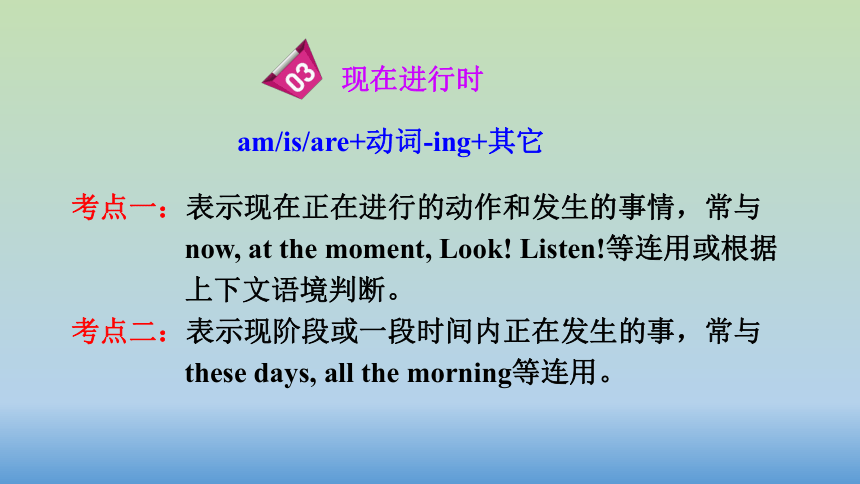
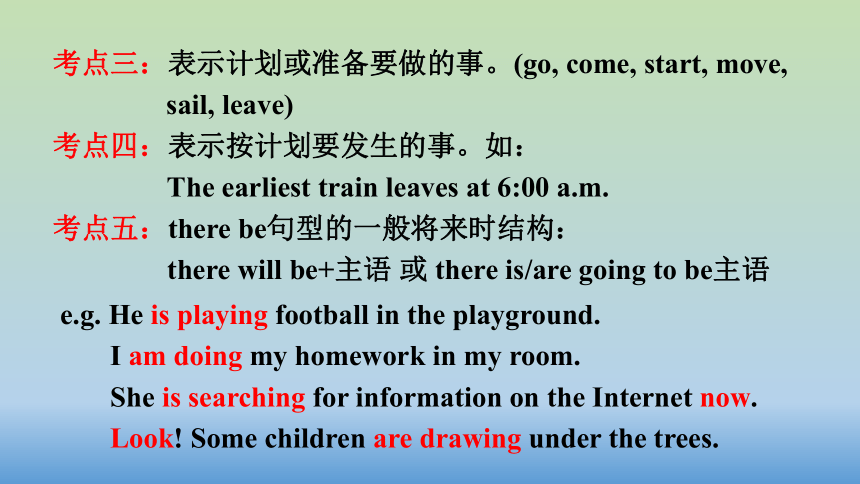
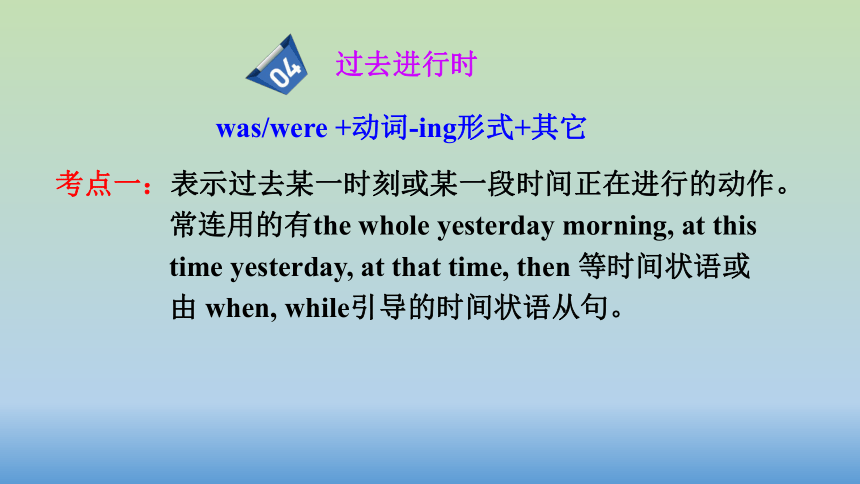
文档简介
动词时态
主语+am/is/are或动词原形/第三人称单数
事实、客观真理,现阶段经常性或习惯性的动作或状态;时间和条件状语从句中用一般现在时表将来
often,
sometimes,
usually等频度副词
一般现在时
主语+was/wer或动词过去式
过去发生的动作或存在的状态
just
now,
yesterday,
this
morning
一般过去时
主语+will/shall+动词原形或be
going
to+动词原形
将来发生的动作或存在的状态
in
the
future,
next
day,
in
two
days
一般将来时
主语+am/is/are
+
V.-ing
目前正在发生的动作或现阶段正在进行的动作或持续的状态
now,
at
the
moment,
look,
listen
现在进行时
主语
+
was/were
+
V.-ing
在过去某一时刻或动作以前发生并完成的动作,过去的过去
at
that
time,
at
this
time
yesterday
过去进行时
主语
+
have/has
+
done
从过去某一时刻开始一直持续到现在的动作或状态或过去发生的动作对现在造成的后果或影响
already,
yet,
since,
just
现在完成时
考点一:表示经常性或习惯性的动作,常与often,
usually,
always,
sometimes,
every
day等连用。
考点二:表示现在的情况或状态。
考点三:表示客观事实或永恒的真理。
考点四:如果主句为一般将来时,在时间、条件状语从句中,用一般现在时表示将来。
be
(am
/
is
/are)
/行为动词原形/行为动词第三人称单数形式+其他
一般将来时
e.g.
She?goes?to
work
at
7:00
every
day.
I?like?bananas.
The
moon?moves?round
the
Earth.
I
will
discuss
this
with
you
when
we?meet?next
time.
I’ll
stay
at
home
if
it?rains?tomorrow.
The
plane?takes?off
at
9:20
am.
考点一:will+动词原形:将来要发生的动作或存在的状态,常与表示将来的时间状语tomorrow,
next
time,
in
a
few
days,
next
Monday,
in
the
future,
in+时间段,
soon,
right
away?等连用。
考点二:be
going
to+动词原形:将要发生的动作或安排、打算,或有某种迹象表明即将发生某事。
助动词will/shall
+?动词原形
be
going
to+动词原形
一般将来时
考点三:其他可表示将来的时态:
1.?现在进行时可表示计划或准备要做的事;
2.?一般现在时可表示按计划要发生的事。如:
The
Smiths
are
going
fishing
tomorrow.
The
first
bus
leaves
at
6:00
a.m.
结构:助动词will
/
shall
+?动词原形
will可用于主语为各种人称的句子中;
shall主要用于主语为第一人称的句子中,尤其是在疑问句中,主语为第一人称时,通常用shall。
e.g.
We
will
have
a
sports
meeting
in
two
months.
Where
shall
we
go
for
our
holidays?
Dave
is
going
to
learn
the
guitar
next
year.
考点一:表示现在正在进行的动作和发生的事情,常与now,
at
the
moment,
Look!
Listen!等连用或根据上下文语境判断。
考点二:表示现阶段或一段时间内正在发生的事,常与these
days,
all
the
morning等连用。
am/is/are+动词-ing+其它
现在进行时
考点三:表示计划或准备要做的事。(go,
come,
start,
move,
sail,
leave)
考点四:表示按计划要发生的事。如:
The
earliest
train
leaves
at
6:00
a.m.
考点五:there
be句型的一般将来时结构:
there
will
be+主语
或
there
is/are
going
to
be主语
e.g.
He
is
playing
football
in
the
playground.
I
am
doing
my
homework
in
my
room.
She
is
searching
for
information
on
the
Internet
now.
Look!
Some
children
are
drawing
under
the
trees.
考点一:表示过去某一时刻或某一段时间正在进行的动作。常连用的有the
whole
yesterday
morning,
at
this
time
yesterday,
at
that
time,
then?等时间状语或由?when,
while引导的时间状语从句。
was/were
+动词-ing形式+其它
过去进行时
考点二:由when引导的时间状语从句,若主句的动作正在进行,这时从句的动作发生了,则主句用过去进行时,从句用一般过去时。
考点三:由while引导的时间状语从句,当从句的动作正在进行,这时主句的动作发生了,则从句用过去进行时,主句用一般过去时。若主从句的动作在过去同时进行,则主从句均用过去进行时。
e.g.
We
were
playing
basketball
at
nine
yesterday
morning.
Susan
was
taking
an
acting
lesson
from
one
to
three
yesterday
afternoon.
What
were
you
doing
when
the
accident
happened??
While
my
mother
was
cooking,
I
was
doing
my
homework.
While
Jenny
was
having
dinner,
her
father
came
back.
考点一:表示过去发生的动作或存在的状态,常与其连用的时间状语有yesterday,
the
day
before
yesterday,
a
few
minutes
ago,
last
week,
just
now,
in
1999?等。
考点二:表示过去的习惯或经常发生的动作,句中常有always,
often,
usually等频度副词。
was/were/行为动词过去式
一般过去时
e.g.
Bob?was?at
home
just
now.
I
always
went
to
the
farm
with
my
sister
when
we
were
at
primary
school.
He?visited?Guilin?in
2019.
Did?you?live?in
Guangzhou
in
2018?
Were?you
happy
at
the
party?
Where
were
you
last
night?
考点一:表示过去发生或已经完成的动作对现在造成的影响或结果,常与already,
just,
yet,
ever,
never,
before,
so
far,
recently,
in
the
past/last
...
years/months等连用或根据上下文语境判断。
助动词have/has+动词的过去分词
现在完成时
考点二:表示过去某一时间开始并一直持续到现在的动作或状态,也许还要持续下去,适用于延续性动词,常与for+时间段或since+时间点或since引导的时间状语从句连用。
考点三:一些短暂性动词转换成意义相近的延续性动词或be+形容词/副词/介词短语/a(n)+名词,与表示一段时间的状语连用。如:
buy?→?have????
??????????borrow?→?keep?
move?→?live?
???
begin/start?→?be
on
die?→?be
dead???
????
open?→?be
open?
fall
asleep?→?be
asleep
leave?→?be
away??
?
come?→?be
in??
join?→?be
in
+组织/be
a
member
【注意】
have/has
been
to?到过某地(现在已经回来了);
have/has
gone
to?去某地了(但还没有回来)。
e.g.
I’ve
already
posted
the
photos.
I
haven’t
watered
the
plants
yet.
Has
he
found
his
watch
yet?
I
have
been
in
the
army
for
more
than
5
years.
?
My
father
has
gone
to
Guangzhou
and
will
come
back
tomorrow.
He
has
lived
here
since
1978.
考点一:by(在某时前,到某时)构成的短语表示过去的时间时,句子常用过去完成时。
考点二:by
the
time
(在……以前)和when/before引导的时间状语从句使用了一般过去时,如果主句的动作发生在从句动作之前,此时主句用过去完成时。
考点三:在含有宾语从句的复合句中,主句使用了一般过去时,而从句的动作发生在主句动作之前,此时从句用过去完成时。
助动词had+过去分词
过去完成时
e.g.
I
forgot
to
tell
you
that
I
had
read
this
novel
before.
Luke
had
been
in?China?for
seven
years
by
the
end
of
last
year.
By
ten
o’clock
yesterday
evening,
she
had
finished
her
homework.
By
the
time
I
got
home,
my
father
had
left
for?New
York.
The
Smiths
were
glad
to
know
that
their
son
had
won
the
competition.
现在完成时:动作发生在说话之前某个没有明确说出的过去时间,侧重过去发生的动作对现在的影响或造成的结果,与现在有关;
过去完成时:动作发生在“过去的过去”,是相对时态,不能离开过去的时间而独立存在。
e.g.
We
have
lived
here
for
ten
years.
We
had
lived
here
for
ten
years
when
we
had
to
move
last
year.
现在完成时
&
过去完成时
1.
现在完成时:过去发生的某一动作对现在造成的影响或结果,强调过去发生的事情和现在有联系;
一般过去时:表示过去的动作或状态,强调过去发生的事情与现在没有联系。
现在完成时
&
一般过去时
e.g.
She
has
written
some
short
stories.
她写了一些短篇小说。
(写的动作发生在过去,但和现在有联系,说明成就。)
She
wrote
the
short
stories
in
Shanghai.
这些短篇小说是她在上海写的。
(写的动作发生在过去,与现在没有联系。)
2.
现在完成时:表示从过去某一时间开始的动作一直持续到现在;
一般过去时:强调动作发生在过去。
e.g.
Linda
has
worked
in
our
school
for
two
years.
琳达在我们学校工作两年了。
(工作的动作发生在过去,并持续到现在。)
Linda
worked
in
our
school
two
years
ago.
琳达两年前在我们学校工作。
(工作的动作发生在过去,现在已结束。)
1.?一般过去时:过去某个时间发生的动作、存在的状态或过去经常发生的动作。谓语动词用动词过去式,常与yesterday,
last
year,
in
1965,
a
moment
ago?等表示过去的时间状语连用;
过去进行时:在过去某一时刻或某一段时间正在进行或发生的动作。常与this
time
yesterday,
at
that
time,
at
eight
last
night等时间状语以及when,
while等引导的时间状语从句连用。
一般过去时
&
过去进行时
e.g.
He?visited?Guilin?in
1998.
I?was?sixteen
years
old
last
year.
What?was?he?doing?at
eight
yesterday
morning?
His
mother?was
cooking?when
he
came
back
home.
2.?一般过去时:在过去某一时间已经完成的动作,所指的过去时间比较笼统;
过去进行时:表示动作的持续性,在当时尚未完成,且所指的过去时间比较具体。
e.g.
She
watched
a
movie
last
night.
她昨晚看了一部电影。(已经看完)
She
was
watching
a
movie
at
nine
last
night.
她昨晚九点在看电影。(当时正在观看)
根据句意及所给动词,用其正确时态填空。
1.
_______
it
_______(cost)
much
to
live
here?
2.
The
teacher
looked
at
the
clean
classroom
and
said
we
___________(do)
a
good
job.
3.
The
Smiths
___________(change)
greatly
in
the
last
two
years.
4.
He
heard
her
singing
loudly
in
the
next
room,
so
he
___________(read)
in
a
louder
voice.
5.
We
__________(learn)
about
ten
English
songs
by
the
end
of
last
term.
Does
cost
had
done
have
changed
read
had
learnt/?
did
learned?
6.
Father
said
that
he
__________(buy)
a
new
bike
for
me
the
next
Friday.
7.
Bill
isn’t
here.
He
__________(chat)
with
his
friends
in
the
classroom.
8.
The
teacher
said
that
the
moon
__________(go)
round
the
earth.
9.
Listen!
They
__________(talk)
about
the
new
film.
10.
His
sister
__________(marry)
a
doctor
on
May
1st,
2020.
11.
The
reporter
__________(interview)
the
little
boy
just
now.
12.
The
Greens
__________(watch)
TV
now.
would
buy
is
chatting
goes
are
talking
married
interviewed
are
watching
13.
We
__________(study)
English
for
about
three
years.
14.
My
brother
__________(join)
the
army
in
2017.
15.
The
farmers
__________(pick)
apples
when
I
saw
them.
16.
The
film
__________(begin)
when
I
got
to
the
cinema.
17.
My
sister
is
a
student
and
she
__________(study)
at
a
middle
school
nearby.
18.
Mr
Green
__________(travel)
to
several
places
in
South
China
since
he
came
here.
19.
You
__________(catch)
the
early
bus
if
you
get
up
early.
20.
I
__________(stay)
there
for
two
months
last
year.
have
studied
joined
were
picking
had
begun
studies
has
travelled
will
catch
stayed
根据短文内容及括号内所给词的提示填空。
Yesterday
I
cleaned
my
room.
I
(1)
__________
(clear)
out
many
old
things
from
the
boxes
under
my
bed.
One
of
them
was
an
old
model
car.
Since
I
(2)
_________
(be)
six
years
old,
I
have
had
it.
I
(3)
__________
(have)
it
for
eight
years.
In
the
past
I
often
(4)
_________
(play)
with
it.
Since
two
years
ago,
I
(5)
_____________
(not
play)
with
it.
I
have
decided
to
give
it
away
to
kids
in
need.
cleared?
was
have
had
played
haven’t
played
1.
There
________
a
basketball
game
next
Monday.
If
it
________,
we’ll
have
to
put
it
off.
(2020云南)
A.
is
going
to
have;
will
rain
B.
is
going
to
have;
rains
C.
is
going
to
be;
rains
D.
is
going
to
be;
will
rain
C
2.
He
________
this
city
when
he
was
eighteen.
(2020广西桂林)
A.
leaves
B.
doesn’t
leave
C.
left
C
3.
Tom
_______
when
I
called
him
yesterday.
(2020吉林)
A.
read
B.
is
reading
C.
was
reading
C
4.
Corn
production
_______
nearly
125
percent
over
the
past
25
years
in
China.
(2020内蒙古呼和浩特)
A.
jumped
B.
jumps
C.
will
jump
D.
has
jumped
D
5.
John
_______
us
when
he
is
free.
(2020辽宁丹东)
A.
joins
B.
join
C.
will
join
D.
joined
C
6.?—Let’s?go?camping?if?it
_______
next?Saturday.
—But?nobody?knows?if?it
_______.
(2020四川凉山)
A.?is?fine;?rains
B.?will?be?fine;?rains
?
C.
is?fine;?will?rain
D.?will?be?fine;?will?rain
C
7.
—The
2022
Winter
Olympic
Games
________
in
Beijing.
—What
good
news!
I
can’t
wait
to
watch
it.
(2020湖北孝感)
A.
hold
B.
will
hold
C.
were
held
D.
will
be
held
D
8.
—Is
Helen
here?
—Not
yet,
but
she
_______
in
half
an
hour.
(2020湖北武汉)
A.
arrives
B.
will
arrive
C.
arrived
D.
has
arrived
B
10.
By
the
time
the
teacher
came,
we
______
cleaning
the
classroom.
(2020黑龙江)
A.
finished
B.
have
finished
C.
had
finished
9.
Mr
Jiang
_____
the
company
to
develop
the
5G
network
for
years.
Now
he
works
as
the
chief
engineer
in
it.
(2020南通)
A.
joined
B.
was
a
member
of
C.
has
joined
D.
has
been
a
member
of
D
C
句子翻译。
1.
这个周末,威海有一场大型音乐会。(2020山东威海)
There
will
be/is
going
to
be
a
big
concert
in
Weihai
this
weekend.
A
big
concert
will
be
held
in
Weihai
this
weekend.
2.
昨天我在海滩上散步的时候,看到一个画家在画画。
(2020山东威海)
When/While
I
was
walking
on
the
beach.
I
saw
a
penitent/an
artist
drawing/painting
(a
picture)
yesterday.
3.
不要开始这个项目,除非一切就绪。(2020江苏苏州)
Don’t
start
the
project
unless
everything
is
ready.
4.
那是如此漫长的一段旅程,每个人都筋疲力尽了。(2020苏州)
That
was
such
a
long
journey
that
everyone
was
tired
out.
5.
我想知道他们是否已经去过那家新的书店。(2020江苏苏州)
I
wonder
if
they
have
been
to
that
new
bookshop.
6.
我们的国家越来越强大。(get)
(2019山东潍坊)
Our
country
is
getting
stronger
and
stronger.
7.
这个村庄现在变得如此美丽,每年很多游客来到这里。(so....
that....
)
(2019山东潍坊)
The
village
has
become
so
beautiful
that
many
tourists
come
here
every
year.
8.
所有的教室昨天都打扫了一遍。(2019山东威海)
All
the
classrooms
were
cleaned
yesterday.
10.
如果你每天练习,你的听力技能将得到提高。(2019苏州)
If
you
practise
every
day,
your
listening
skill
will
be
improved.
11.
他们从小学起就一直是好朋友。(2019扬州)
They
have
been
good
friends
since
primary
school.
9.
我们吃晚饭的时候,一只鸟儿从窗户飞了进来。(2019威海)
When/While
we
were
having
dinner/supper,
a
bird
flew
in
by/through
the/
a
window.
根据所给汉语和提示词完成下列句子。
1.
他从地上爬起来,自言自语道:“我能行!”(say)
(2020恩施)
He
rose
up
from
the
ground
and
_____________
,
“I
can
do
it!
2.
在七岁的时候,这个男孩经常想出一些有创意的想法。
At
___________
7,
the
boy
often
____________
some
creative
ideas.
(2020江苏淮安)
3.
我们自从加入同一个俱乐部就成了好朋友。(2020淮安)
We
___________
good
friends
since
we
___________
club.
said
to
himself
the
age
of
have
been
came
up
with
joined
4.
我弟弟每天很早起床去上学。(get)
(2020湖北黄冈)
My
brother
very
early
to
school
every
day.
5.
胡老师正在给学生们发新书。(
give)
(2020湖北黄冈)
Mr.
Hu
new
books
to
the
students.
6.
中国在很多国家已经建立了5G基站。(set)
(2020湖北黄冈)
China
________________
5G
stations
in
many
countries.
7.
网课期间,我们多数人作业都很认真。(do)
(2020湖北宜昌)
Most
of
us
__________________
very
carefully
when
we
had
classes
online.
gets
up
is
giving
out
has(already)
set
up
did
(our)
homework
8.
知识源于质疑。(from)
(2019湖北宜昌)
Knowledge
____________
questioning.
9.
好运总是属于有准备的人。(2019湖北宜昌)
Good
luck
always
__________
somebody
that
has
prepared
es/is
from
belongs
to
动词填空。(2020山东菏泽)
Miguel
Lures,
the
mayor
(市长),
opens
the
windows
of
his
office,
and
the
sound
of
human
voices
(rise)
from
the
street
below.
Lures
says,
“More
than
14,000
cars
used
to
pass
along
this
street
every
day.
There
(be)
more
cars
passing
through
the
city
in
a
day
than
people
living
here.”
rises
were
The
change
(bring
)
Pontevedra
many
advantages
since
then.
Traffic
accidents
seldom
happen.
CO2
emissions
(排放物)
are
down
70
percent….
Most
local
people
in
the
city
like
the
change.
…
Raquel
Garcia,
another
parent,
said
she
had
stayed
in
many
cities
around
the
world.
However,
she
had
never
lived
in
a
city
as
“easy
to
live
in”
as
Pontevedra.
“Even
while
it
___________
(rain).
I
walk
everywhere.
The
feeling
is
wonderful,”
she
added….
has
brought
is
raining
语法综合填空。
Over
the
years,
the
idea
of
celebrating
Father's
Day
on
the
third
Sunday
of
June
(spread)
across
the
world.
(2020湖北荆门)
Recently,
he
noticed
that
his
sons
____________
(fight)
among
themselves
and
seemed
unable
to
agree
on
anything.
(2020湖北天门)
I’ve
listened
to
your
lecture
so
many
times
that
I’ve
learnt
it
by
heart.
No
one
(know)
you
at
this
university,
so
they
won’t
find
out.
(2020四川南充)
has
spread
were
fighting
knows
4.
While
I
(walk)
to
the
hall
of
the
station,
I
saw
a
young
woman
put
something
next
to
a
sleeping
homeless
man.
(2020山东烟台)
5.
During
the
summer
of
2010,
he
(spend)
four
weeks
at
a
summer
camp.
(2020山东聊城)
6.
Among
these
is
Zhong
Wei,
a
46-year-old
husband
and
father.
He
(live)
in
Wenzhou
for
the
last
13
years.
(2020湖北黄冈)
was
walking
spent
has
lived
动词语态
动词的语态分为主动语态和被动语态。
考点一:被动语态由“be+及物动词的过去分词”构成,be有人称、数和时态的变化。具体表示方式如下(以done为例):
一般现在时的被动语态:
am
/
is
/
are+done
一般过去时的被动语态:
was
/
were+done
一般将来时的被动语态:
will
be+done
现在完成时的被动语态:
have
/
has+been+done
含有情态动词的被动语态:
情态动词+be+done
掌握
了解
《义务教育英语课程标准》
1.
I
think
e-books
will
_______more
than
paper
books
in
the
future.
(2020广西桂林)
use
B
be
used
C.
used
2.
More
trees
__________
every
year
to
make
our
city
greener.
(2020广西百色)
is
planted
B.
are
planted
C.
was
planted
D.
were
planted
B
B
3.
How
delicious
the
cake
is!
It
_______
by
my
grandmother
this
morning.
(2020吉林)
made
B.
is
made
C.
was
made
4.
—It
was
amazing
that
Huoshenshan
Hospital
______
in
such
a
short
time
at
the
beginning
of
2020.
—Yes.
That’s
China
Speed.
(2020辽宁营口)
A.
built
B.
is
built
C.
was
built
D.
has
built
C
C
5.
—
Have
you
tasted
baozza,
a
mixture
of
pizza
and
baozi?
—
Sure.
Thousands
of
baozza
_______
at
a
baozi
factory
in
Yangzhou
each
day
next
month.
(2020江苏扬州中考)
will
make
B.
makes
C.
was
made
D.
will
be
made
6.
As
the
most
exciting
and
traditional
way
to
shop,
street
markets
______
here
and
there
in
China
these
days.
(2020四川凉山中考)
A.
find
B.
found
C.
are
found
D.
were
found
D
C
7.
—Mr.
White,
when
shall
I
hand
in
my
report?
—As
soon
as
it
________
tomorrow.
(2020湖北鄂州中考)
finishes
B.
will
finish
C.
will
be
finished
D.
is
finished
8.
—
A
new
airport
will
be
built
in
Tantou,
Longhui.
—
Good
news!
But
a
lot
of
good
farmland
______.
(2020湖南邵阳中考)
A.
will
waste
B.
may
be
wasted
C.
has
wasted
D
B
9.
As
soon
as
books
______,
the
volunteers
posted
them
to
the
students
in
Hope
Primary
School.
(2020江苏南通中考)
A.
are
raised
B.
were
raised
C.
raised
D.
have
raised
10.
It
is
reported
that
the
Tokyo
2020
Olympics
________
no
later
than
summer
2021.
(2020江苏镇江中考)
A.
is
held
B.
will
be
held
C.
will
hold
D.
hold
B
B
11.
—Mr.
Wang
is
very
famous
in
our
school.
—That’s
for
sure.
He
______
by
reporters
tomorrow.
(2020辽宁铁岭葫芦岛)
interviews
B.
interviewed
C.
is
interviewed
D.
will
be
interviewed
12.
The
air
pollution
is
very
serious
in
our
city.
Something
_______
about
it
now.
(2020贵州毕节中考)
can
do
B.
must
do
C.
was
done
D.
must
be
done
D
D
13.
—
Will
you
go
to
Lisa's
housewarming
party
next
Sunday?
—
Well,
if
I
_________,
I
will
go
on
time.
(2020山东滨州中考)
invite
B.
will
invite
C.
am
invited
D.
will
be
invited
14.
Train
tickets______
online.
It
is
convenient.
(2020河北)
A.
sold
B.
were
sold
C.
are
sold
D.
have
sold
C
C
考点二:
使役动词(make,
let
等)及感官动词(hear,
feel,
watch,
see
等),在主动语态句子中后面接不带to
的动词不定式(短语)作宾语补足语,在被动语态句子中后面要接带to
的动词不定式(短语)作主语补足语。如:
The
teacher
makes
her
students
finish
their
homework
before
Saturday.
→
The
students
are
made
to
finish
their
homework
before
Saturday
(by
the
teacher).
I.
句型转换。
1.
Lucy's
mother
often
makes
her
read
English
aloud
at
home.
(改为被动语态)
(2019甘肃天水)
Lucy
is
often
made
_______
_______
English
aloud
at
home.
2.
I
often
see
him
play
football
after
school.
(改为被动语态)
He
is
often
______
______
play
football
after
school.
to
read
seen
?
to
4.
The
boy
was
seen
_____
computer
games
in
the
net
bar.
A.
play
?
?
?
?
?
?
?
?
?
?
B.
played
C.
playing???????????????
D.
to
play
D
3.
The
boss
in
this
factory
made
the
workers
work
for
12
hours
a
day
in
the
past.?
(改为被动语态)
The
workers
in
this
factory
_____
made
_____
work
for
12
hours
a
day
in
the
past.
were
to
Ⅱ.
改为被动语态。
1.
I
often
hear
Sally
sing
in
her
room.
2.
We
saw
them
go
out.
3.
The
man
made
the
young
children
work
in
the
factory.
Sally
is
often
heard
to
sing
in
her
room
by
me.
They
were
seen
to
go
out
by
us.
The
young
children
were
made
to
work
in
the
factory
by
the
man.
考点三:
含有双宾语的主动语态句子变为被动语态句子时,
如果直接宾语作句子的主语,
那么间接宾语前需要加介词to或for。如:
He
showed
me
some
photos
last
night.
→
I
was
showed
some
photos
by
him
last
night.
Some
photos
were
showed
to
me
by
him
last
night.
1.
In
Miss
Lin's
class,
many
chances
______
to
students
to
learn
from
each
other.
(2020江苏连云港)
offer
B.
offered
C.
are
offering
D.
are
offered
2.
Chinese
tea
is
very
popular,
and
it
______
to
many
different
parts
of
the
world.
(2020湖南湘潭)
A.
is
sent
B.
sends
C.
has
sent
D
A
改为被动语态(将直接宾语作为句子的主语)
1.
He
wrote
her
a
letter.
2.
The
old
man
told
us
a
story
yesterday.
A
letter
was
written
to
her
by
him.
A
story
was
told
to
us
by
the
old
man
yesterday.
考点四:
有些动词的主动形式可以表被动意义。
taste,
look,
feel,
smell,
sound
等系动词。如:
The
dish
tastes
well.
2.
sell,
write,
dry,
wash
等用作不及物动词且主语为物时。如:
Ted's
pen
writes
well.
This
dress
dries
quickly.
1.
—
How
does
the
banana
milk
shake
_______?
—
Delicious.
I’d
like
to
have
another
glass.
(2020湖北襄阳)
look
B.
smell
C.
taste
D.
sound
2.
May
I
have
some
more
chicken?
It
______
so
delicious.
(2020湖北天门中考)
A.
feels
B.
smells
C.
tastes
D.
sounds
C
C
【Notes】taste在这两题中,都属于主动表被动的用法。
3.
The
tickets
for
The
Wandering
Earth
_____
well,
and
they
will
_____
soon.
(2019四川宜宾)
A.
are
sold;
sell
out
B.
are
sold;
sold
out
C.
sell;
be
sold
out
C
4.?The?cheese?cake
______
so?good?that
I?can't?wait?to?eat?it.
(2018
浙江温州)
A.?tastes
B.?feels
C.?sounds
D.?smells
D
主语+am/is/are或动词原形/第三人称单数
事实、客观真理,现阶段经常性或习惯性的动作或状态;时间和条件状语从句中用一般现在时表将来
often,
sometimes,
usually等频度副词
一般现在时
主语+was/wer或动词过去式
过去发生的动作或存在的状态
just
now,
yesterday,
this
morning
一般过去时
主语+will/shall+动词原形或be
going
to+动词原形
将来发生的动作或存在的状态
in
the
future,
next
day,
in
two
days
一般将来时
主语+am/is/are
+
V.-ing
目前正在发生的动作或现阶段正在进行的动作或持续的状态
now,
at
the
moment,
look,
listen
现在进行时
主语
+
was/were
+
V.-ing
在过去某一时刻或动作以前发生并完成的动作,过去的过去
at
that
time,
at
this
time
yesterday
过去进行时
主语
+
have/has
+
done
从过去某一时刻开始一直持续到现在的动作或状态或过去发生的动作对现在造成的后果或影响
already,
yet,
since,
just
现在完成时
考点一:表示经常性或习惯性的动作,常与often,
usually,
always,
sometimes,
every
day等连用。
考点二:表示现在的情况或状态。
考点三:表示客观事实或永恒的真理。
考点四:如果主句为一般将来时,在时间、条件状语从句中,用一般现在时表示将来。
be
(am
/
is
/are)
/行为动词原形/行为动词第三人称单数形式+其他
一般将来时
e.g.
She?goes?to
work
at
7:00
every
day.
I?like?bananas.
The
moon?moves?round
the
Earth.
I
will
discuss
this
with
you
when
we?meet?next
time.
I’ll
stay
at
home
if
it?rains?tomorrow.
The
plane?takes?off
at
9:20
am.
考点一:will+动词原形:将来要发生的动作或存在的状态,常与表示将来的时间状语tomorrow,
next
time,
in
a
few
days,
next
Monday,
in
the
future,
in+时间段,
soon,
right
away?等连用。
考点二:be
going
to+动词原形:将要发生的动作或安排、打算,或有某种迹象表明即将发生某事。
助动词will/shall
+?动词原形
be
going
to+动词原形
一般将来时
考点三:其他可表示将来的时态:
1.?现在进行时可表示计划或准备要做的事;
2.?一般现在时可表示按计划要发生的事。如:
The
Smiths
are
going
fishing
tomorrow.
The
first
bus
leaves
at
6:00
a.m.
结构:助动词will
/
shall
+?动词原形
will可用于主语为各种人称的句子中;
shall主要用于主语为第一人称的句子中,尤其是在疑问句中,主语为第一人称时,通常用shall。
e.g.
We
will
have
a
sports
meeting
in
two
months.
Where
shall
we
go
for
our
holidays?
Dave
is
going
to
learn
the
guitar
next
year.
考点一:表示现在正在进行的动作和发生的事情,常与now,
at
the
moment,
Look!
Listen!等连用或根据上下文语境判断。
考点二:表示现阶段或一段时间内正在发生的事,常与these
days,
all
the
morning等连用。
am/is/are+动词-ing+其它
现在进行时
考点三:表示计划或准备要做的事。(go,
come,
start,
move,
sail,
leave)
考点四:表示按计划要发生的事。如:
The
earliest
train
leaves
at
6:00
a.m.
考点五:there
be句型的一般将来时结构:
there
will
be+主语
或
there
is/are
going
to
be主语
e.g.
He
is
playing
football
in
the
playground.
I
am
doing
my
homework
in
my
room.
She
is
searching
for
information
on
the
Internet
now.
Look!
Some
children
are
drawing
under
the
trees.
考点一:表示过去某一时刻或某一段时间正在进行的动作。常连用的有the
whole
yesterday
morning,
at
this
time
yesterday,
at
that
time,
then?等时间状语或由?when,
while引导的时间状语从句。
was/were
+动词-ing形式+其它
过去进行时
考点二:由when引导的时间状语从句,若主句的动作正在进行,这时从句的动作发生了,则主句用过去进行时,从句用一般过去时。
考点三:由while引导的时间状语从句,当从句的动作正在进行,这时主句的动作发生了,则从句用过去进行时,主句用一般过去时。若主从句的动作在过去同时进行,则主从句均用过去进行时。
e.g.
We
were
playing
basketball
at
nine
yesterday
morning.
Susan
was
taking
an
acting
lesson
from
one
to
three
yesterday
afternoon.
What
were
you
doing
when
the
accident
happened??
While
my
mother
was
cooking,
I
was
doing
my
homework.
While
Jenny
was
having
dinner,
her
father
came
back.
考点一:表示过去发生的动作或存在的状态,常与其连用的时间状语有yesterday,
the
day
before
yesterday,
a
few
minutes
ago,
last
week,
just
now,
in
1999?等。
考点二:表示过去的习惯或经常发生的动作,句中常有always,
often,
usually等频度副词。
was/were/行为动词过去式
一般过去时
e.g.
Bob?was?at
home
just
now.
I
always
went
to
the
farm
with
my
sister
when
we
were
at
primary
school.
He?visited?Guilin?in
2019.
Did?you?live?in
Guangzhou
in
2018?
Were?you
happy
at
the
party?
Where
were
you
last
night?
考点一:表示过去发生或已经完成的动作对现在造成的影响或结果,常与already,
just,
yet,
ever,
never,
before,
so
far,
recently,
in
the
past/last
...
years/months等连用或根据上下文语境判断。
助动词have/has+动词的过去分词
现在完成时
考点二:表示过去某一时间开始并一直持续到现在的动作或状态,也许还要持续下去,适用于延续性动词,常与for+时间段或since+时间点或since引导的时间状语从句连用。
考点三:一些短暂性动词转换成意义相近的延续性动词或be+形容词/副词/介词短语/a(n)+名词,与表示一段时间的状语连用。如:
buy?→?have????
??????????borrow?→?keep?
move?→?live?
???
begin/start?→?be
on
die?→?be
dead???
????
open?→?be
open?
fall
asleep?→?be
asleep
leave?→?be
away??
?
come?→?be
in??
join?→?be
in
+组织/be
a
member
【注意】
have/has
been
to?到过某地(现在已经回来了);
have/has
gone
to?去某地了(但还没有回来)。
e.g.
I’ve
already
posted
the
photos.
I
haven’t
watered
the
plants
yet.
Has
he
found
his
watch
yet?
I
have
been
in
the
army
for
more
than
5
years.
?
My
father
has
gone
to
Guangzhou
and
will
come
back
tomorrow.
He
has
lived
here
since
1978.
考点一:by(在某时前,到某时)构成的短语表示过去的时间时,句子常用过去完成时。
考点二:by
the
time
(在……以前)和when/before引导的时间状语从句使用了一般过去时,如果主句的动作发生在从句动作之前,此时主句用过去完成时。
考点三:在含有宾语从句的复合句中,主句使用了一般过去时,而从句的动作发生在主句动作之前,此时从句用过去完成时。
助动词had+过去分词
过去完成时
e.g.
I
forgot
to
tell
you
that
I
had
read
this
novel
before.
Luke
had
been
in?China?for
seven
years
by
the
end
of
last
year.
By
ten
o’clock
yesterday
evening,
she
had
finished
her
homework.
By
the
time
I
got
home,
my
father
had
left
for?New
York.
The
Smiths
were
glad
to
know
that
their
son
had
won
the
competition.
现在完成时:动作发生在说话之前某个没有明确说出的过去时间,侧重过去发生的动作对现在的影响或造成的结果,与现在有关;
过去完成时:动作发生在“过去的过去”,是相对时态,不能离开过去的时间而独立存在。
e.g.
We
have
lived
here
for
ten
years.
We
had
lived
here
for
ten
years
when
we
had
to
move
last
year.
现在完成时
&
过去完成时
1.
现在完成时:过去发生的某一动作对现在造成的影响或结果,强调过去发生的事情和现在有联系;
一般过去时:表示过去的动作或状态,强调过去发生的事情与现在没有联系。
现在完成时
&
一般过去时
e.g.
She
has
written
some
short
stories.
她写了一些短篇小说。
(写的动作发生在过去,但和现在有联系,说明成就。)
She
wrote
the
short
stories
in
Shanghai.
这些短篇小说是她在上海写的。
(写的动作发生在过去,与现在没有联系。)
2.
现在完成时:表示从过去某一时间开始的动作一直持续到现在;
一般过去时:强调动作发生在过去。
e.g.
Linda
has
worked
in
our
school
for
two
years.
琳达在我们学校工作两年了。
(工作的动作发生在过去,并持续到现在。)
Linda
worked
in
our
school
two
years
ago.
琳达两年前在我们学校工作。
(工作的动作发生在过去,现在已结束。)
1.?一般过去时:过去某个时间发生的动作、存在的状态或过去经常发生的动作。谓语动词用动词过去式,常与yesterday,
last
year,
in
1965,
a
moment
ago?等表示过去的时间状语连用;
过去进行时:在过去某一时刻或某一段时间正在进行或发生的动作。常与this
time
yesterday,
at
that
time,
at
eight
last
night等时间状语以及when,
while等引导的时间状语从句连用。
一般过去时
&
过去进行时
e.g.
He?visited?Guilin?in
1998.
I?was?sixteen
years
old
last
year.
What?was?he?doing?at
eight
yesterday
morning?
His
mother?was
cooking?when
he
came
back
home.
2.?一般过去时:在过去某一时间已经完成的动作,所指的过去时间比较笼统;
过去进行时:表示动作的持续性,在当时尚未完成,且所指的过去时间比较具体。
e.g.
She
watched
a
movie
last
night.
她昨晚看了一部电影。(已经看完)
She
was
watching
a
movie
at
nine
last
night.
她昨晚九点在看电影。(当时正在观看)
根据句意及所给动词,用其正确时态填空。
1.
_______
it
_______(cost)
much
to
live
here?
2.
The
teacher
looked
at
the
clean
classroom
and
said
we
___________(do)
a
good
job.
3.
The
Smiths
___________(change)
greatly
in
the
last
two
years.
4.
He
heard
her
singing
loudly
in
the
next
room,
so
he
___________(read)
in
a
louder
voice.
5.
We
__________(learn)
about
ten
English
songs
by
the
end
of
last
term.
Does
cost
had
done
have
changed
read
had
learnt/?
did
learned?
6.
Father
said
that
he
__________(buy)
a
new
bike
for
me
the
next
Friday.
7.
Bill
isn’t
here.
He
__________(chat)
with
his
friends
in
the
classroom.
8.
The
teacher
said
that
the
moon
__________(go)
round
the
earth.
9.
Listen!
They
__________(talk)
about
the
new
film.
10.
His
sister
__________(marry)
a
doctor
on
May
1st,
2020.
11.
The
reporter
__________(interview)
the
little
boy
just
now.
12.
The
Greens
__________(watch)
TV
now.
would
buy
is
chatting
goes
are
talking
married
interviewed
are
watching
13.
We
__________(study)
English
for
about
three
years.
14.
My
brother
__________(join)
the
army
in
2017.
15.
The
farmers
__________(pick)
apples
when
I
saw
them.
16.
The
film
__________(begin)
when
I
got
to
the
cinema.
17.
My
sister
is
a
student
and
she
__________(study)
at
a
middle
school
nearby.
18.
Mr
Green
__________(travel)
to
several
places
in
South
China
since
he
came
here.
19.
You
__________(catch)
the
early
bus
if
you
get
up
early.
20.
I
__________(stay)
there
for
two
months
last
year.
have
studied
joined
were
picking
had
begun
studies
has
travelled
will
catch
stayed
根据短文内容及括号内所给词的提示填空。
Yesterday
I
cleaned
my
room.
I
(1)
__________
(clear)
out
many
old
things
from
the
boxes
under
my
bed.
One
of
them
was
an
old
model
car.
Since
I
(2)
_________
(be)
six
years
old,
I
have
had
it.
I
(3)
__________
(have)
it
for
eight
years.
In
the
past
I
often
(4)
_________
(play)
with
it.
Since
two
years
ago,
I
(5)
_____________
(not
play)
with
it.
I
have
decided
to
give
it
away
to
kids
in
need.
cleared?
was
have
had
played
haven’t
played
1.
There
________
a
basketball
game
next
Monday.
If
it
________,
we’ll
have
to
put
it
off.
(2020云南)
A.
is
going
to
have;
will
rain
B.
is
going
to
have;
rains
C.
is
going
to
be;
rains
D.
is
going
to
be;
will
rain
C
2.
He
________
this
city
when
he
was
eighteen.
(2020广西桂林)
A.
leaves
B.
doesn’t
leave
C.
left
C
3.
Tom
_______
when
I
called
him
yesterday.
(2020吉林)
A.
read
B.
is
reading
C.
was
reading
C
4.
Corn
production
_______
nearly
125
percent
over
the
past
25
years
in
China.
(2020内蒙古呼和浩特)
A.
jumped
B.
jumps
C.
will
jump
D.
has
jumped
D
5.
John
_______
us
when
he
is
free.
(2020辽宁丹东)
A.
joins
B.
join
C.
will
join
D.
joined
C
6.?—Let’s?go?camping?if?it
_______
next?Saturday.
—But?nobody?knows?if?it
_______.
(2020四川凉山)
A.?is?fine;?rains
B.?will?be?fine;?rains
?
C.
is?fine;?will?rain
D.?will?be?fine;?will?rain
C
7.
—The
2022
Winter
Olympic
Games
________
in
Beijing.
—What
good
news!
I
can’t
wait
to
watch
it.
(2020湖北孝感)
A.
hold
B.
will
hold
C.
were
held
D.
will
be
held
D
8.
—Is
Helen
here?
—Not
yet,
but
she
_______
in
half
an
hour.
(2020湖北武汉)
A.
arrives
B.
will
arrive
C.
arrived
D.
has
arrived
B
10.
By
the
time
the
teacher
came,
we
______
cleaning
the
classroom.
(2020黑龙江)
A.
finished
B.
have
finished
C.
had
finished
9.
Mr
Jiang
_____
the
company
to
develop
the
5G
network
for
years.
Now
he
works
as
the
chief
engineer
in
it.
(2020南通)
A.
joined
B.
was
a
member
of
C.
has
joined
D.
has
been
a
member
of
D
C
句子翻译。
1.
这个周末,威海有一场大型音乐会。(2020山东威海)
There
will
be/is
going
to
be
a
big
concert
in
Weihai
this
weekend.
A
big
concert
will
be
held
in
Weihai
this
weekend.
2.
昨天我在海滩上散步的时候,看到一个画家在画画。
(2020山东威海)
When/While
I
was
walking
on
the
beach.
I
saw
a
penitent/an
artist
drawing/painting
(a
picture)
yesterday.
3.
不要开始这个项目,除非一切就绪。(2020江苏苏州)
Don’t
start
the
project
unless
everything
is
ready.
4.
那是如此漫长的一段旅程,每个人都筋疲力尽了。(2020苏州)
That
was
such
a
long
journey
that
everyone
was
tired
out.
5.
我想知道他们是否已经去过那家新的书店。(2020江苏苏州)
I
wonder
if
they
have
been
to
that
new
bookshop.
6.
我们的国家越来越强大。(get)
(2019山东潍坊)
Our
country
is
getting
stronger
and
stronger.
7.
这个村庄现在变得如此美丽,每年很多游客来到这里。(so....
that....
)
(2019山东潍坊)
The
village
has
become
so
beautiful
that
many
tourists
come
here
every
year.
8.
所有的教室昨天都打扫了一遍。(2019山东威海)
All
the
classrooms
were
cleaned
yesterday.
10.
如果你每天练习,你的听力技能将得到提高。(2019苏州)
If
you
practise
every
day,
your
listening
skill
will
be
improved.
11.
他们从小学起就一直是好朋友。(2019扬州)
They
have
been
good
friends
since
primary
school.
9.
我们吃晚饭的时候,一只鸟儿从窗户飞了进来。(2019威海)
When/While
we
were
having
dinner/supper,
a
bird
flew
in
by/through
the/
a
window.
根据所给汉语和提示词完成下列句子。
1.
他从地上爬起来,自言自语道:“我能行!”(say)
(2020恩施)
He
rose
up
from
the
ground
and
_____________
,
“I
can
do
it!
2.
在七岁的时候,这个男孩经常想出一些有创意的想法。
At
___________
7,
the
boy
often
____________
some
creative
ideas.
(2020江苏淮安)
3.
我们自从加入同一个俱乐部就成了好朋友。(2020淮安)
We
___________
good
friends
since
we
___________
club.
said
to
himself
the
age
of
have
been
came
up
with
joined
4.
我弟弟每天很早起床去上学。(get)
(2020湖北黄冈)
My
brother
very
early
to
school
every
day.
5.
胡老师正在给学生们发新书。(
give)
(2020湖北黄冈)
Mr.
Hu
new
books
to
the
students.
6.
中国在很多国家已经建立了5G基站。(set)
(2020湖北黄冈)
China
________________
5G
stations
in
many
countries.
7.
网课期间,我们多数人作业都很认真。(do)
(2020湖北宜昌)
Most
of
us
__________________
very
carefully
when
we
had
classes
online.
gets
up
is
giving
out
has(already)
set
up
did
(our)
homework
8.
知识源于质疑。(from)
(2019湖北宜昌)
Knowledge
____________
questioning.
9.
好运总是属于有准备的人。(2019湖北宜昌)
Good
luck
always
__________
somebody
that
has
prepared
es/is
from
belongs
to
动词填空。(2020山东菏泽)
Miguel
Lures,
the
mayor
(市长),
opens
the
windows
of
his
office,
and
the
sound
of
human
voices
(rise)
from
the
street
below.
Lures
says,
“More
than
14,000
cars
used
to
pass
along
this
street
every
day.
There
(be)
more
cars
passing
through
the
city
in
a
day
than
people
living
here.”
rises
were
The
change
(bring
)
Pontevedra
many
advantages
since
then.
Traffic
accidents
seldom
happen.
CO2
emissions
(排放物)
are
down
70
percent….
Most
local
people
in
the
city
like
the
change.
…
Raquel
Garcia,
another
parent,
said
she
had
stayed
in
many
cities
around
the
world.
However,
she
had
never
lived
in
a
city
as
“easy
to
live
in”
as
Pontevedra.
“Even
while
it
___________
(rain).
I
walk
everywhere.
The
feeling
is
wonderful,”
she
added….
has
brought
is
raining
语法综合填空。
Over
the
years,
the
idea
of
celebrating
Father's
Day
on
the
third
Sunday
of
June
(spread)
across
the
world.
(2020湖北荆门)
Recently,
he
noticed
that
his
sons
____________
(fight)
among
themselves
and
seemed
unable
to
agree
on
anything.
(2020湖北天门)
I’ve
listened
to
your
lecture
so
many
times
that
I’ve
learnt
it
by
heart.
No
one
(know)
you
at
this
university,
so
they
won’t
find
out.
(2020四川南充)
has
spread
were
fighting
knows
4.
While
I
(walk)
to
the
hall
of
the
station,
I
saw
a
young
woman
put
something
next
to
a
sleeping
homeless
man.
(2020山东烟台)
5.
During
the
summer
of
2010,
he
(spend)
four
weeks
at
a
summer
camp.
(2020山东聊城)
6.
Among
these
is
Zhong
Wei,
a
46-year-old
husband
and
father.
He
(live)
in
Wenzhou
for
the
last
13
years.
(2020湖北黄冈)
was
walking
spent
has
lived
动词语态
动词的语态分为主动语态和被动语态。
考点一:被动语态由“be+及物动词的过去分词”构成,be有人称、数和时态的变化。具体表示方式如下(以done为例):
一般现在时的被动语态:
am
/
is
/
are+done
一般过去时的被动语态:
was
/
were+done
一般将来时的被动语态:
will
be+done
现在完成时的被动语态:
have
/
has+been+done
含有情态动词的被动语态:
情态动词+be+done
掌握
了解
《义务教育英语课程标准》
1.
I
think
e-books
will
_______more
than
paper
books
in
the
future.
(2020广西桂林)
use
B
be
used
C.
used
2.
More
trees
__________
every
year
to
make
our
city
greener.
(2020广西百色)
is
planted
B.
are
planted
C.
was
planted
D.
were
planted
B
B
3.
How
delicious
the
cake
is!
It
_______
by
my
grandmother
this
morning.
(2020吉林)
made
B.
is
made
C.
was
made
4.
—It
was
amazing
that
Huoshenshan
Hospital
______
in
such
a
short
time
at
the
beginning
of
2020.
—Yes.
That’s
China
Speed.
(2020辽宁营口)
A.
built
B.
is
built
C.
was
built
D.
has
built
C
C
5.
—
Have
you
tasted
baozza,
a
mixture
of
pizza
and
baozi?
—
Sure.
Thousands
of
baozza
_______
at
a
baozi
factory
in
Yangzhou
each
day
next
month.
(2020江苏扬州中考)
will
make
B.
makes
C.
was
made
D.
will
be
made
6.
As
the
most
exciting
and
traditional
way
to
shop,
street
markets
______
here
and
there
in
China
these
days.
(2020四川凉山中考)
A.
find
B.
found
C.
are
found
D.
were
found
D
C
7.
—Mr.
White,
when
shall
I
hand
in
my
report?
—As
soon
as
it
________
tomorrow.
(2020湖北鄂州中考)
finishes
B.
will
finish
C.
will
be
finished
D.
is
finished
8.
—
A
new
airport
will
be
built
in
Tantou,
Longhui.
—
Good
news!
But
a
lot
of
good
farmland
______.
(2020湖南邵阳中考)
A.
will
waste
B.
may
be
wasted
C.
has
wasted
D
B
9.
As
soon
as
books
______,
the
volunteers
posted
them
to
the
students
in
Hope
Primary
School.
(2020江苏南通中考)
A.
are
raised
B.
were
raised
C.
raised
D.
have
raised
10.
It
is
reported
that
the
Tokyo
2020
Olympics
________
no
later
than
summer
2021.
(2020江苏镇江中考)
A.
is
held
B.
will
be
held
C.
will
hold
D.
hold
B
B
11.
—Mr.
Wang
is
very
famous
in
our
school.
—That’s
for
sure.
He
______
by
reporters
tomorrow.
(2020辽宁铁岭葫芦岛)
interviews
B.
interviewed
C.
is
interviewed
D.
will
be
interviewed
12.
The
air
pollution
is
very
serious
in
our
city.
Something
_______
about
it
now.
(2020贵州毕节中考)
can
do
B.
must
do
C.
was
done
D.
must
be
done
D
D
13.
—
Will
you
go
to
Lisa's
housewarming
party
next
Sunday?
—
Well,
if
I
_________,
I
will
go
on
time.
(2020山东滨州中考)
invite
B.
will
invite
C.
am
invited
D.
will
be
invited
14.
Train
tickets______
online.
It
is
convenient.
(2020河北)
A.
sold
B.
were
sold
C.
are
sold
D.
have
sold
C
C
考点二:
使役动词(make,
let
等)及感官动词(hear,
feel,
watch,
see
等),在主动语态句子中后面接不带to
的动词不定式(短语)作宾语补足语,在被动语态句子中后面要接带to
的动词不定式(短语)作主语补足语。如:
The
teacher
makes
her
students
finish
their
homework
before
Saturday.
→
The
students
are
made
to
finish
their
homework
before
Saturday
(by
the
teacher).
I.
句型转换。
1.
Lucy's
mother
often
makes
her
read
English
aloud
at
home.
(改为被动语态)
(2019甘肃天水)
Lucy
is
often
made
_______
_______
English
aloud
at
home.
2.
I
often
see
him
play
football
after
school.
(改为被动语态)
He
is
often
______
______
play
football
after
school.
to
read
seen
?
to
4.
The
boy
was
seen
_____
computer
games
in
the
net
bar.
A.
play
?
?
?
?
?
?
?
?
?
?
B.
played
C.
playing???????????????
D.
to
play
D
3.
The
boss
in
this
factory
made
the
workers
work
for
12
hours
a
day
in
the
past.?
(改为被动语态)
The
workers
in
this
factory
_____
made
_____
work
for
12
hours
a
day
in
the
past.
were
to
Ⅱ.
改为被动语态。
1.
I
often
hear
Sally
sing
in
her
room.
2.
We
saw
them
go
out.
3.
The
man
made
the
young
children
work
in
the
factory.
Sally
is
often
heard
to
sing
in
her
room
by
me.
They
were
seen
to
go
out
by
us.
The
young
children
were
made
to
work
in
the
factory
by
the
man.
考点三:
含有双宾语的主动语态句子变为被动语态句子时,
如果直接宾语作句子的主语,
那么间接宾语前需要加介词to或for。如:
He
showed
me
some
photos
last
night.
→
I
was
showed
some
photos
by
him
last
night.
Some
photos
were
showed
to
me
by
him
last
night.
1.
In
Miss
Lin's
class,
many
chances
______
to
students
to
learn
from
each
other.
(2020江苏连云港)
offer
B.
offered
C.
are
offering
D.
are
offered
2.
Chinese
tea
is
very
popular,
and
it
______
to
many
different
parts
of
the
world.
(2020湖南湘潭)
A.
is
sent
B.
sends
C.
has
sent
D
A
改为被动语态(将直接宾语作为句子的主语)
1.
He
wrote
her
a
letter.
2.
The
old
man
told
us
a
story
yesterday.
A
letter
was
written
to
her
by
him.
A
story
was
told
to
us
by
the
old
man
yesterday.
考点四:
有些动词的主动形式可以表被动意义。
taste,
look,
feel,
smell,
sound
等系动词。如:
The
dish
tastes
well.
2.
sell,
write,
dry,
wash
等用作不及物动词且主语为物时。如:
Ted's
pen
writes
well.
This
dress
dries
quickly.
1.
—
How
does
the
banana
milk
shake
_______?
—
Delicious.
I’d
like
to
have
another
glass.
(2020湖北襄阳)
look
B.
smell
C.
taste
D.
sound
2.
May
I
have
some
more
chicken?
It
______
so
delicious.
(2020湖北天门中考)
A.
feels
B.
smells
C.
tastes
D.
sounds
C
C
【Notes】taste在这两题中,都属于主动表被动的用法。
3.
The
tickets
for
The
Wandering
Earth
_____
well,
and
they
will
_____
soon.
(2019四川宜宾)
A.
are
sold;
sell
out
B.
are
sold;
sold
out
C.
sell;
be
sold
out
C
4.?The?cheese?cake
______
so?good?that
I?can't?wait?to?eat?it.
(2018
浙江温州)
A.?tastes
B.?feels
C.?sounds
D.?smells
D
同课章节目录
- 词法
- 名词
- 动词和动词短语
- 动词语态
- 动词时态
- 助动词和情态动词
- 非谓语动词
- 冠词
- 代词
- 数词和量词
- 形容词副词及其比较等级
- 介词和介词短语
- 连词和感叹词
- 构词法
- 相似、相近词比较
- 句法
- 陈述句
- 一般疑问句和否定疑问句
- 特殊疑问句及选择疑问句
- 反意疑问句
- 存在句(There be句型)
- 宾语从句
- 定语从句
- 状语从句
- 主谓一致问题
- 简单句
- 并列句
- 复合句
- 主谓一致
- 主、表语从句
- 名词性从句
- 直接引语和间接引语
- 虚拟语气
- 感叹句
- 强调句
- 倒装句
- 祈使句
- 句子的成分
- 句子的分类
- 题型专区
- 单项选择部分
- 易错题
- 完形填空
- 阅读理解
- 词汇练习
- 听说训练
- 句型转换
- 补全对话
- 短文改错
- 翻译
- 书面表达
- 任务型阅读
- 语法填空
- 其他资料
